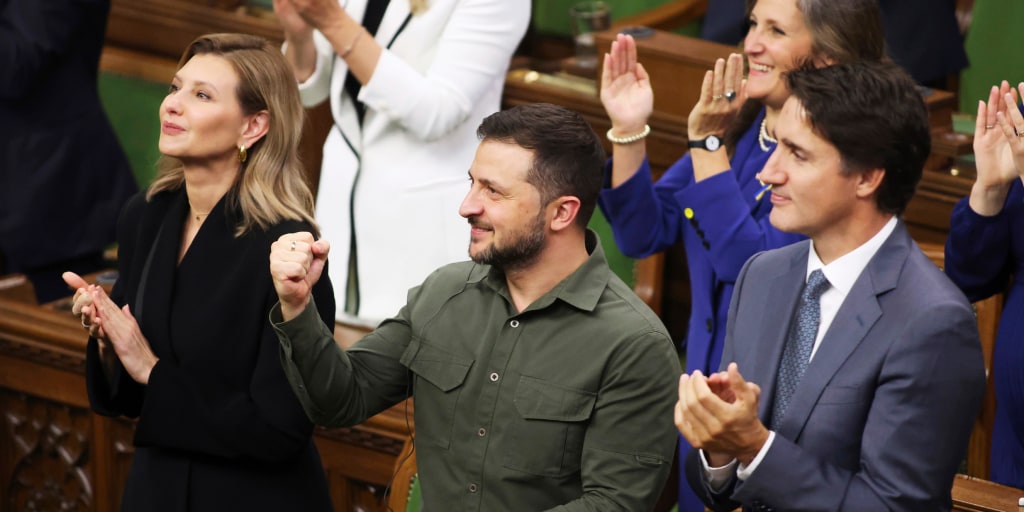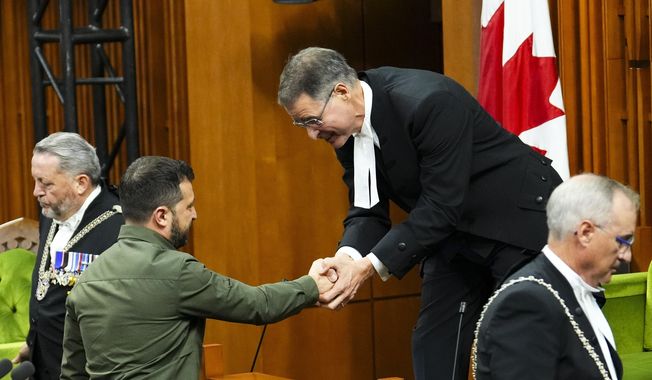Anthony Rota, former Speaker of the House of Commons, is facing backlash and public calls to resign after honouring a Ukrainian soldier who fought for a Nazi Unit during the Second World War.
On September 22, Volodymyr Zelenskyy, Jewish President of Ukraine, was midway through his first official visit to Ottawa since Russia’s attempted invasion of the country in 2022, and during his time in the House of Commons, where he was to address parliament, he was a part of two separate standing ovations for a 98-year-old man by the name of Yaroslav Hunka, a Ukrainian veteran who had been invited by Rota to be honoured as a symbol of “Ukrainian Independence against the Russians.”
In the days that followed, Jewish groups made the information public that Hunka had served in the First Ukrainian Division, which was a voluntary unit that followed the order of the Nazis during WWII. The honouring, which included several Jewish members of parliament alongside Zelensky, took place only two days before after Yom Kippur, a Jewish holiday focused on reflecting on sins and asking for forgiveness.
Since the information came out about the honoured veteran, there have been uproarious statements on behalf of opposition parties that are putting the Liberal Government to blame, along with numerous apologies from Rota and other parliamentarians. On the following Sunday, Rota issued a written apology, and then on the following Monday during House of Commons proceedings, he delivered another.

“I wish to make clear that no one, including fellow parliamentarians and the Ukraine delegation, was aware of my intention or of my remarks before I delivered them,” he said. “I accept full responsibility for my actions.”
Despite Rota’s numerous apologies, both government officials and members of the community are struggling to find words alone suitable for reconciliation.
Peter Jullian, an NDP member of parliament, was documented strongly advising Rota to resign from his role. “Unfortunately, I believe a sacred trust has been broken. It’s for that reason, for the good of the institution of the House of Commons that I say sadly, I don’t believe you can continue in this role.”
Rota was also denounced by Bloc Québécois Leader Yves-François Blanchet, who agreed with the call for Rota’s resignation.
Prime Minister Justin Trudeau was stopped by reporters on Parliament Hill after the event began to spread in the media, where he made a few public statements regarding both Rota’s position in the House of Commons as well as the impact that the recent events have had on the community and country.

“It’s extremely upsetting that this happened. The Speaker has acknowledged his mistake and has apologized,” Trudeau said. “But this is something that is deeply embarrassing to the Parliament of Canada and by extension to all Canadians.”
Trudeau went on to make further statements, warning that the event may assist in fueling Russian propaganda given that Russian President Vladimir Putin has claimed that the conflict between Russia and Ukraine was centralized around rooting out the Nazi population. He emphasized that it was crucial to keep moving forward with the country’s support for Ukraine.
Hunka has come out to defend his war service in local media, claiming that despite the tragedies in correlation with his service, it was all a part of Ukraine’s fight for independence.
Resignation
As of September 26, Anthony Rota has made the decision to resign. During his resignation speech, Rota expressed his regret for recognizing the 98-year-old veteran.
“I must step down as your Speaker. I reiterate my profound regret for my error in recognizing an individual in the House.” Rota said. “That public recognition has caused pain to individuals and communities, including the Jewish community in Canada and around the world, in addition to survivors of Nazi atrocities in Poland, among other nations. I accept full responsibility for my actions.”

The Baron reached out to UNB’s Chair of the Politics and History department, Dr. JP Lewis for a comment on the rapidly evolving situation. It was midway through The Baron’s meeting with Lewis that news of Rota’s resignation reached the team.
“Governments do embarrassing things all the time.” Said Lewis. “A question that’s worth asking is: what is the point of no return?”
The Professor went on to emphasize the sensitive nature of politics, expressing that the reason for the event’s rapid acceleration on an international level over the weekend was largely to do with the mention of Nazis, a word that is globally associated with tragedy and controversy. Furthermore, he commented on the process of the Liberal government gradually turning on Rota and increasing the pressure for him to resign from his role.
“They [the Liberal Government] don’t want to have to explain their way out of this,” Lewis explained. He then went on to reference a quote from The Reagan Diaries, written by Ronald Reagan: “If you’re explaining, you’re losing.”
Bloc Québécois MP Louis Plamondon will serve as interim Speaker until a new one is elected on Tuesday.


